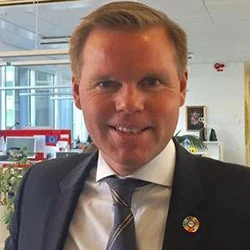
While working in the Galápagos Islands in the late 1980s, I saw the interplay between the many interests on the islands: local fishermen taking advantage of the rich waters around in the archipelago; the research community building on the evolutionary theories discovered by Charles Darwin; the tourism sector responding to an ever-growing interest in the accessible and unique wildlife and fauna; and the rights of the Ecuadorian state to benefit from this national asset. Finding a way to balance these – sometimes conflicting – interests in a manner that allows for sustainable and equitable growth is what we today call the Blue Economy.
The blue economy provides food, jobs, water, and is a source of economic growth. It provides the livelihood for hundreds of millions of the poorest and most vulnerable people in the world. By one estimate, it generates USD 3-6 trillion to the world economy. If it were a country, the oceanic economy would be the seventh largest in the world.
But oceans face major challenges. Almost a third of the global fish stock are overfished. Climate change is impacting ecosystems in both the oceans and along the coast line. Unbridled development in sensitive coastal areas create irreparable erosion. Pollution and marine litter from both land and marine sources threaten the health of our oceans – including its biodiversity – which may have large implications on food supply and pose potential risks to human health through the food chain, albeit not yet well understood.
The good news is that the global community is responding. The first ever United Nations Ocean Conference in 2017, the G7-meeting in Canada in June this year and the upcoming Blue Economy Conference in Kenya are but a few indications that we are collectively taking the challenge seriously. And when the international community agreed on a joint roadmap for global development – the Sustainable Development Goals – the ocean got its own goal (SDG 14) with clear targets and indicators. Countries such as Canada, Fiji, Germany, Grenada, Kenya, Norway, Portugal, Sweden are showing the way through national and global leadership.
To help guide these efforts, the UN, the World Bank and 15 other global stakeholders agreed on a way to frame the Blue Economy concept, to create common language that facilitates action. In The Potential of the Blue Economy, the report identified five types of activities: harvesting and trade of marine living resources; extraction and use of marine non-living resources; use of renewable non-exhaustible natural forces (blue energy); commerce and trade in and around the oceans; and those activities that indirectly contribute to the economy, such as carbon sequestration, coastal protection, waste disposal and biodiversity.
The way forward is an economic development of the oceans that is both inclusive and environmentally sound : it should be undertaken in a manner that does not deplete the natural resources that societies – including local communities – depend on in the long term. To balance the economic, social and environmental dimensions of sustainable development in relation to oceans are the driving considerations behind Blue Economy.
We need to break with “business as usual” and think differently. We need to take advantage of new technologies that can offer new solutions, such as mobile technology that allows for better data on fish landings and fish stock health. We need to integrate long-term thinking into financial decisions by using tools such as marine spatial planning and natural capital accounting. International finance should be offered products that allow them to contribute, e.g. through blue bonds, as is being done by the Seychelles. Efforts to strengthen fishing sectors in poor and vulnerable countries should be encouraged to ensure sustainable and legal fishing practices as well as greater local value creation, such as in the Solomon Islands. And ambitious waste and water treatment investments – such as Indonesia’s USD 1 billion program affecting some 50 million people – should be supported and celebrated.
The World Bank is deeply committed to supporting the blue economy, with a blue portfolio of USD 2.6 billion in investments , through important knowledge work such as the Sunken Billions reports, as well as by supporting improved governance, fiscal and financial reforms at local, national and global levels.
Together with the United Nations and other partners, we are looking forward to working with member states and other stakeholders to respond to existing challenges and to design a way forward that allow for sustainable economic growth making the most from the oceans – building on the experience with green growth – including in unique areas such as the Galápagos Islands.


Join the Conversation